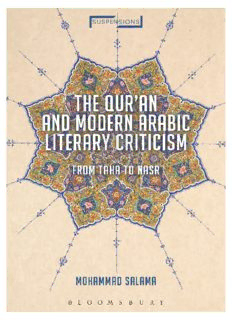
The Qur’an and Modern Arabic Literary Criticism: From Taha to Nasr PDF
Preview The Qur’an and Modern Arabic Literary Criticism: From Taha to Nasr
The Qur’ān and Modern Arabic Literary Criticism Suspensions: Contemporary Middle Eastern and Islamicate Thought Series Editors: Jason Mohaghegh and Lucian Stone This series interrupts standardized discourses involving the Middle East and the Islamicate world by introducing creative and emerging ideas. The incisive works included in this series provide a counterpoint to the reigning canons of theory, theology, philosophy, literature, and criticism through investigations of vast experiential typologies—such as violence, mourning, vulnerability, tension, and humor—in light of contemporary Middle Eastern and Islamicate thought. Continental Philosophy and the Palestinian Question, Zahi Zalloua Gilles Deleuze, Postcolonial Theory, and the Philosophy of Limit, Reda Bensmaia Hostage Spaces of the Contemporary Islamicate World, Dejan Lukic Iranian Identity and Cosmopolitanism, Lucian Stone On the Arab Revolts and the Iranian Revolution, Arshin Adib-Moghaddam The Politics of Writing Islam, Mahmut Mutman Remaking Politics, Markets, and Citizens in Turkey, Ebru Kayaalp Sorcery, Totem, and Jihad in African Philosophy, Christopher Wise Transgression and the Inexistent, Mehdi Belhaj Kacem The Writing of Violence in the Middle East, Jason Bahbak Mohaghegh The Qur’ān and Modern Arabic Literary Criticism From Ṭāhā to Naṣr Mohammad Salama BLOOMSBURY ACADEMIC Bloomsbury Publishing Plc 50 Bedford Square, London, WC1B 3DP, UK 1385 Broadway, New York, NY 10018, USA BLOOMSBURY and the Diana logo are trademarks of Bloomsbury Publishing Plc First published in Great Britain 2018 Copyright © Mohammad Salama, 2018 Mohammad Salama has asserted his right under the Copyright, Designs and Patents Act, 1988, to be identified as Author of this work. For legal purposes the Acknowledgements on p. x–xi constitute an extension of this copyright page. Cover image: Anita Chowdry, Classic Shamsa, mineral colours and gold on Gampi paper, private collection. All rights reserved. No part of this publication may be reproduced or transmitted in any form or by any means, electronic or mechanical, including photocopying, recording, or any information storage or retrieval system, without prior permission in writing from the publishers. A catalogue record for this book is available from the British Library. A catalog record for this book is available from the Library of Congress. Names: Salama, Mohammad, author. Title: The Qur’a¯n and modern Arabic literary criticism : from Taha to Naòsr / Mohammad Salama. Description: New York, NY : Bloomsbury Academic, 2018. | Series: Suspensions: contemporary Middle Eastern and Islamicate thought | Includes bibliographical references and index. Identifiers: LCCN 2017051424| ISBN 9781474254267 (hardback) | ISBN 9781474253277 (epub) Subjects: LCSH: Qur’a¯n as literature. | Qur’ān–Criticism, interpretation, etc. | Criticism–Egypt–History–20th century.Classification: LCC BP131.8 .S245 2018 | DDC 297.1/226–dc23 LC record available at https://lccn.loc.gov/2017051424 ISBN: HB: 978-1-4742-5426-7 ePDF: 978-1-4742-5325-3 ePub: 978-1-4742-5327-7 Series: Suspensions: Contemporary Middle Eastern and Islamicate Thought Typeset by Deanta Global Publishing Services, Chennai, India To find out more about our authors and books visit www.bloomsbury.com and sign up for our newsletters. "ضِ رْ لَْا يِف ثُ كُ مْ َيَف سَ اَّنلا عُ َفنَي امَ امَّ َأوَ ۖ ءً اَفجُ بُ َهذَْيَف دُ َبزَّ لا امَّ َأَف" (رشع ةعباسلا ةيلآا :دعرلا ةروس) “As to the froth, worthless it shall go; and as to what benefits people, it shall remain on the earth.” Qur’ān (13:17) vi Contents Series Foreword viii Acknowledgments x A Note on Transliteration and Translation xii Introduction 1 1 A Cartesian Backfire? Ṭāhā Ḥusayn, the Qur’ān, and the Cogito 17 2 The Return to Philology and the Unmasking of Traditionalism in Amīn al-Khūlī 37 3 Muḥammad Aḥmad Khalafallāh: The Art of Narrative in the Qur’ān 51 4 Bint al-Shāṭi’: Literary Significations in the Qur’ān 65 5 Reclaiming Qur’ānic Exegesis: Naṣr Ḥāmid Abū Zayd between Traditionalism and Postsecularism 77 6 On Metaphor: Abū Zayd and the Ideologies of majāz in the Qur’ān 97 Conclusion 115 Notes 119 Bibliography 145 Index 155 Series Foreword Poets, artists, theologians, philosophers, and mystics in the Middle East and Islamicate world have been interrogating notions of desire, madness, sensuality, solitude, death, time, space, and so on for centuries, thus constituting an expansive and ever-mutating intellectual landscape. Like all theory and creative outpouring, then, theirs is its own vital constellation—a construction cobbled together from singular visceral experiences, intellectual ruins, novel aesthetic techniques, social-political-ideological detours, and premonitions of a future—built and torn down (partially or in toto), and rebuilt again with slight and severe variations. The horizons shift and frequently leave those who dare traverse these lands bewildered and vulnerable. Consequently, these thinkers and their visionary ideas remain largely unknown, or worse, mispronounced and misrepresented in the so-called Western world. In the hands of imperialistic frameworks, a select few thinkers of the Islamic world remain grossly silenced, misrepresented, spoken on behalf of, or rather about. Their ideas are simplified into mere social formulae and empirical scholarly categories. Whereas so-called Western philosophers and writers are given full leniency to contemplate the most incisive or abstract ideas, non-Western thinkers, especially those located in the imagined realms of the Middle East and Islamicate world, are reduced to speaking of purely political histories or monolithic cultural narratives. In other words, they are distorted and contorted to fit within hegemonic paradigms that steal away their more captivating potentials. Contributors to this series provide a counterpoint to the reigning canons of theory, theology, philosophy, literature, and criticism through investigations of the vast experiential typologies of such regions. Each volume in the series acts as a “suspension” in the sense that the authors will position contemporary thought in an enigmatic new terrain of inquiry, where it will be compelled to confront unforeseen works of critical and creative imagination. These analyses Series Foreword ix will not only highlight the full range of current intellectual and artistic trends and their benefits for the citizens of these phantom spheres, but also argue that the ideas themselves are borderless, and are thus of great relevance to all citizens of the world. Jason Bahbak Mohaghegh and Lucian Stone
Description: